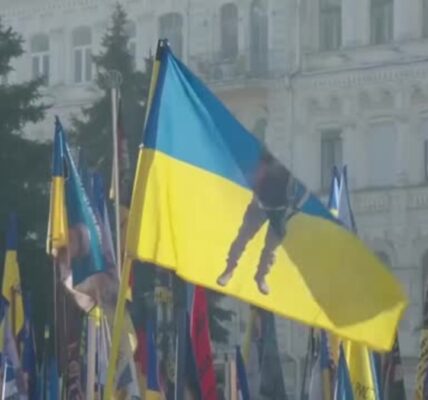Pupils in Russia Take a History Quiz Based on an Interview Between Putin and Tucker Carlson

According to various posts on social media, students throughout Russia participated in a history quiz this month where they watched portions of an interview between President Vladimir Putin and American commentator Tucker Carlson.
During his two-hour interview with Carlson in February, Putin spent thirty minutes educating him on the history of Russia from 862. He also claimed that Ukraine did not have a history of independent statehood, a belief which was refuted by Kyiv as being inaccurate and manipulative.
On VK, Russian social media platform, schools characterized the quiz as an “intellectual game” that aided in children’s comprehension of “the progression of the Russian state.” They also stated that it was enjoyable while being educational.
Some instances showed that even children as young as 6 or 7 years old were involved. A Rostov school in southern Russia stated that students from first to eleventh grade watched parts of the interview and responded to questions suitable for their age group.
The Domodedovskaya grammar school announced that students were assigned the task of coming up with questions to send to Putin after participating in an 11-round quiz. They acknowledged that not all participants will receive responses from the president due to the event being nationwide, but they remain optimistic.
Reuters contacted eight head teachers and teachers from schools involved in the event for a comment. As of now, none of them have replied.
The Ne Norma volunteer association initially brought attention to the quiz, which aims to monitor the methods used to instill Putin’s perspective on the invasion of Ukraine in Russian youth.
According to Dmitry Tsibiryov, a representative for the project, it was expected that the Carlson interview would be accessible to children, given the extensive coverage it received in state media as part of mass propaganda.
The clips used in the quiz were unclear. Carlson faced backlash after the interview for not challenging the Russian leader enough, and even Putin expressed a desire for more challenging questions.
The multiple-choice quiz items were created to strengthen the concepts emphasized by Putin. For example, children were required to be aware that during the 13th century, the term “Ukrainian” could refer to a boundary defender or an individual residing on the borderlands, but not to a person from a nation known as Ukraine.
Tsibiryov mentioned that the quiz served as an illustration of the broader changes in the curriculum during the war. This included the implementation of new classes called “Important Conversations” that focused on patriotic subjects. These classes occasionally involved soldiers and veterans visiting schools.
Previously, Ne Norma has shared instances where children produced items like trench candles and camouflage nets to be sent to soldiers serving in Ukraine.
In October of last year, a photo was released featuring young children in a kindergarten class wearing soldier hats and standing in front of a screen with a quote from 18th century military leader Alexander Suvorov that stated, “A soldier’s appearance should inspire fear in the enemy.”
Putin has told Russians it is important to unite at a time when the country is at war in Ukraine and facing what he says is an existential threat from the West. Last year Kremlin aide Vladimir Medinsky published four new history textbooks for 16- to 18-year-olds reflecting Putin’s view of the fall of the Soviet Union and the causes of the Ukraine conflict.
During a phone interview, Tsibiryov mentioned that the education system is being utilized more and more as a means of spreading propaganda in an attempt to attract new individuals and volunteers for the war.
“According to Tsibiryov, at most, it serves no purpose and is a waste of time. Its main consequence is promoting a false idea of patriotism. These beliefs may linger with children in the long-term, even if they are not directly involved in the war.”
Source: voanews.com




